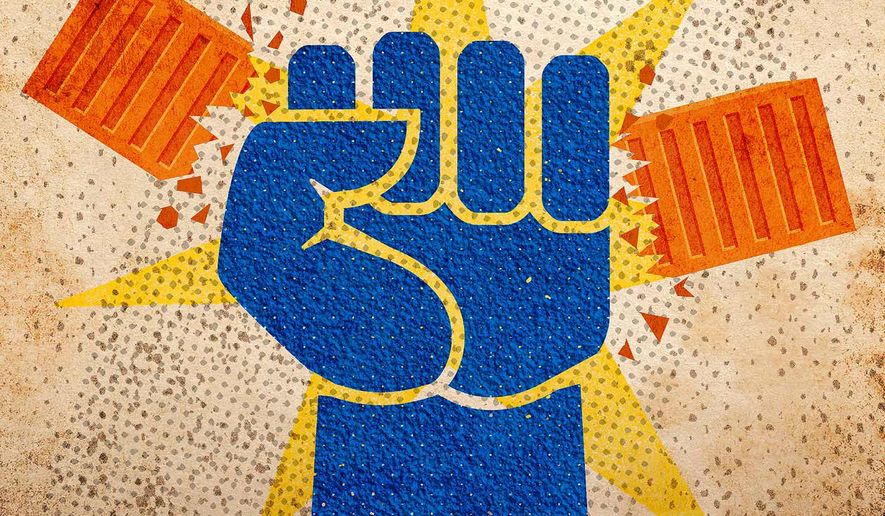OPINION:
As the COVID-19 pandemic weakens, Americans are discovering that store shelves are often empty. Supply chain problems aren’t expected to ease soon and will only worsen as Christmas demand heats up. Pictures of hundreds of loaded container ships off the California Coast unable to get into the overcrowded ports at Los Angeles and Long Beach, which together handle more than 40 % of all U.S. imports, are the reason the shelves are empty.
The crisis is real. This summer, shoppers were advised to do their Christmas shopping early because as the ports become even more clogged, retailers won’t have much to sell. Toys and clothing are already in short supply, and the auto parts that auto repair facilities were once able to get in a day or two now take months to arrive, making it virtually impossible to keep their customers’ cars on the road.
It’s difficult to determine who is to blame for the supply chain breakdown when everyone points at everyone else. President Joe Biden blames habits developed during the pandemic and the hesitancy of workers to venture out in a world where a virus might be lurking. The White House press secretary, in a throwback to President Jimmy Carter’s admonition to wear a sweater during the oil crisis, says consumers are to blame for wanting things they don’t really need.
Others blame the 1920 Jones Act that requires ships trading from point to point within the United States or its territories to be U.S. flag vessels or the short-sightedness of the transportation industry for failing to modernize U.S. ports, ranked as some of the least efficient and most costly in the world.
Of course, everyone’s easiest target is the pandemic disruptions of manufacturers, shippers, and retailers.
There is a smattering of truth to all of this. Still, if one digs down, it becomes clear that much of the blame doesn’t belong on the consumer, the Jones Act, greedy businessmen, or even to the virus, but on federal, state and local politicians who, in partnership with one of the country’s most powerful labor unions, have spent years undermining our ability to unload vessels arriving at our ports and getting goods to American distributors, retailers and manufacturers.
As production at the beginning of the supply chains recovered, the increased flowthrough revealed just how dysfunctional things have become at our end. Our old, inefficient ports at Los Angeles and Long Beach have proven incapable of either offloading vessels, storing empty containers, or loading them onto often non-existent trucks for transport from the ports.
Most modern ports are automated and operate on a 24/7 schedule, but not ours. A 2020 World Bank study ranking port efficiency ranked Los Angeles 328th and Long Beach 333rd in the world. In this country, port modernization has been blocked by the powerful longshoremen’s union, whose members make upwards of $200,000 a year and are never required to work three shifts a day or on weekends or holidays under contracts negotiated with local politicians through the municipal port authorities that own the ports.
Last month, Mr. Biden got the union to temporarily grant a third shift to allow members to work weekends. Mr. Biden declared this, along with a tax on containers that aren’t quickly unloaded, would alleviate the supply chain problem. When he made the announcement, there were more than sixty vessels waiting to unload; within a week, that number had increased to more than a hundred.
What Mr. Biden ignored was that even if the ships could be more quickly offloaded, there aren’t enough trucks available to move the containers to their ultimate destinations. The American Trucking Association says there is a nationwide shortage of truck drivers of something like 80,000 and growing. It’s even worse in California, which many independent owners/operators avoid because of a new legal and regulatory regime that could put them out of business.
The California Trucking Association suggested that part of the problem stems from A.B. 5, a California law passed in 2019 that essentially bans independent owner/operators from the state. Media fact-checkers rushed to assure the public that the law isn’t a real problem without mentioning that a U.S. Appeals Court has stayed their inclusion only until the Supreme Court decides whether to take a case brought by the truckers against the law. If the Court declines to take the case, the stay will end immediately, and thousands of truckers can be expected to refuse to receive or deliver goods within the state.
The Biden Administration has railed on about the problem. Blaming shippers rather than his fellow politicians and believing that anything can be fixed by increasing taxes on somebody, Mr. Biden has persuaded the ports to levy a $100 per day per container on loads waiting to be offloaded and trucked out. The average container ship can carry 24,000 containers or their equivalent. A vessel or shipper could be fined as much as $2.4 million a day. The tax will not solve the problem but will add to already skyrocketing shipping costs.
Add vaccine mandates and local zoning laws that have prevented the efficient use of container storage space at the ports, and you have a perfect storm traceable directly to the very politicians now demanding solutions from anyone but themselves.
• David Keene is editor-at-large for the Washington Times.




Please read our comment policy before commenting.